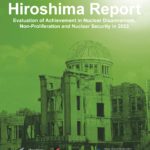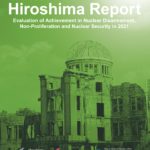Hiroshima Report 20239. Australia ■Non-Nuclear-Weapon State
| Nuclear Disarmament | 22.5 Points | Full Points 48 | 46.9% |
| Along with the other U.S. allies, Australia advocates the “progressive approach” toward a world without nuclear weapons through incremental, practical measures. While Australia has not signed the TPNW, Australia participated in the First Meeting of the States Parties to the TPNW (1MSP). It actively advocated nuclear risk reduction at the NPT RevCon. Australia has increased its reliance on extended (nuclear) deterrence. It is reported that Australia requested the U.S. not to adopt a policy of no first use or sole purpose of nuclear weapons. It has also proactively engaged in cooperation with civil society. Australia participated in the IPNDV. It has actively engaged in the promotion for entry into force of the CTBT. | |||
| Nuclear Non-Proliferation | 56 Points | Full Points 61 | 91.8% |
| Australia is also a state party to the South Pacific Nuclear-Free Zone Treaty. It acceded to the IAEA Additional Protocol, and has applied the integrated safeguards. The Australia-India Nuclear Cooperation Agreement was adopted in 2015, and Australia exports uranium. Australia, the U.K. and the U.S. decided to work together to introduce nuclear submarines to Australia. It continues consultations with the IAEA regarding how to implement IAEA safeguards for their nuclear fuel. | |||
| Nuclear Security | 28 Points | Full Points 38 | 73.7% |
| Australia has ratified all nuclear security-related conventions and established a national implementation system for A/CPPNM. They hosted an IPPAS mission in 2017. They are one of the few countries that have made some of the IPPAS mission reports publicly available. Australia participates in almost all INFCIRC initiatives. | |||






